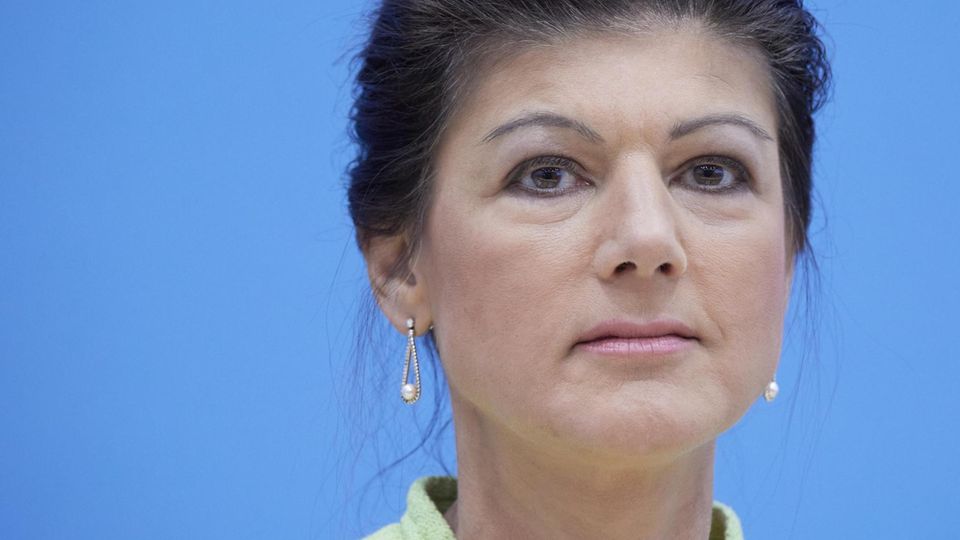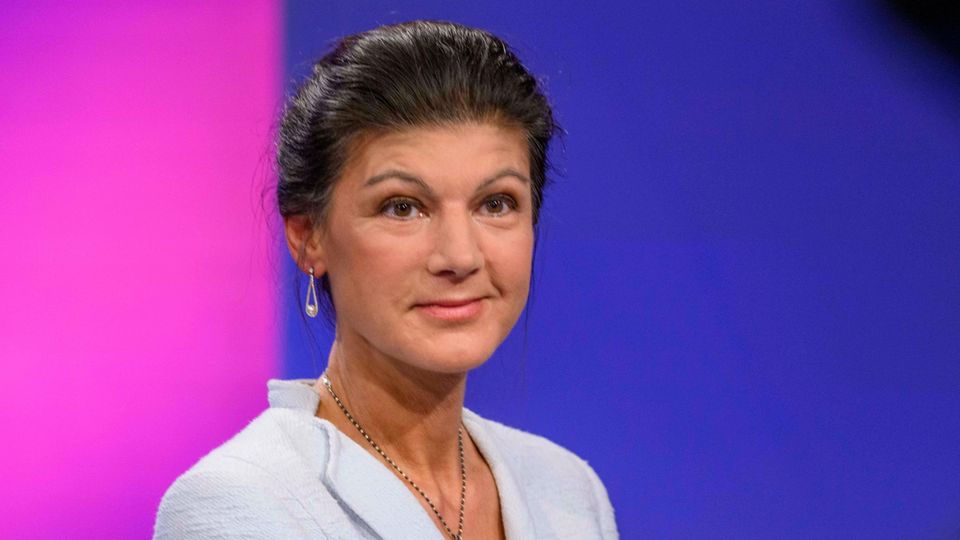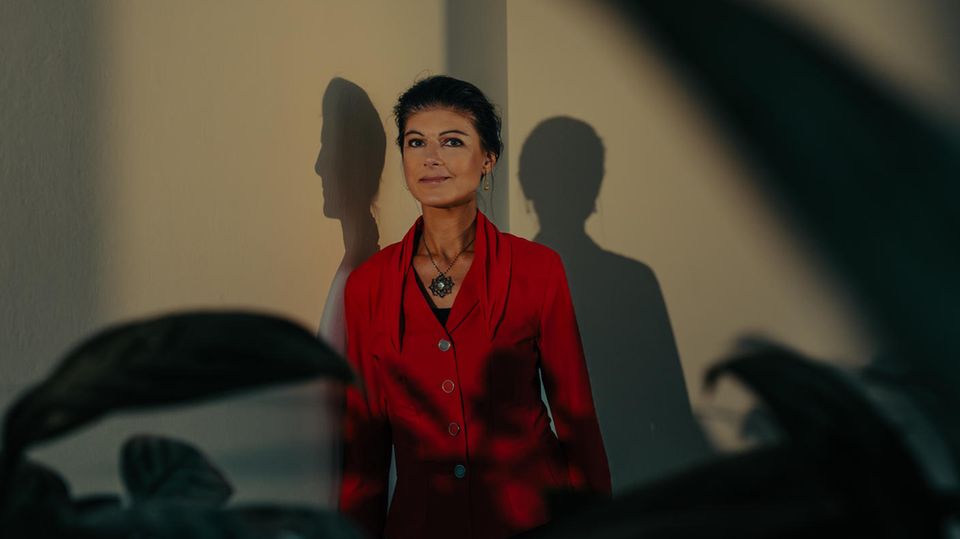Amira Mohamed Ali has had a lightning-fast political career. Now she could become chairwoman of the Wagenknecht party. On the left you rub your eyes in amazement: Please what?
Back then, at the end of October, you might have guessed that she wanted to go back to the top. That a new promotion is waiting for them, perhaps it has already been agreed upon. A Monday, the federal press conference in Berlin. Sahra Wagenknecht presents her plans for her own party. But Wagenknecht remains silent for now. Instead she talks – Amira Mohamed Ali.
“The chairman of this association is sitting in front of you,” says Mohamed Ali welcoming. “I’m the chairwoman.” It sounds as if the whole event was her idea, not that of the woman whose name bears the alliance that promotes the founding of the party. Wagenknecht, who sits to the left of Ali, smiles as her colleague spells out in a serious voice the supposedly “necessary step” to found a new political force. She says that it was inevitable to leave the Left faction together, the faction of which she is actually still the chairwoman. The left is disappearing into “insignificance”. They are sentences that fit.
Of course, the new, left-wing national project, which is scheduled to start at the beginning of next year, depends on Wagenknecht. But Mohamed Ali should be there and will be needed again, even at the front. That was already clear on that Monday.
There are politicians who need half a lifetime to get to where power and attention await. Who fight their way through local associations, despair of opponents, get lost strategically and – if at all – only crawl up the many rungs of a political ladder with great effort and patience. And there are Amira Mohamed Ali, 43, which seems to climb every rung so quickly that new ladders are constantly being placed in front of its feet. Higher, faster, further, welcome to the life of Amira Mohamed Ali.
Here is a brief summary of her political climbing: In 2015, the lawyer joined the Left and became involved in local politics Lower Saxony. In 2016 she was asked whether she would like to run for the Bundestag, and a year later she entered parliament via the state list. She becomes a spokesperson for animal welfare and when Wagenknecht resigns as parliamentary group leader in 2019 due to burnout, Mohamed Ali becomes her successor out of nowhere. And now? She could soon become party leader. Lead the team with which Wagenknecht wants to shake up politics. Wagenknecht himself has just publicly wanted Mohamed Ali to be chairman.
Another one of those ladders going up. Does she ever fall?
Many on the left believe in it, some even hope for it. Let them Mohamed Ali’s time As the leader of the parliamentary group, you are just going through the motions inside yourself, wondering what was actually going on, whether you have just lost a political mega-talent or a simple opportunist who seizes opportunities as soon as they arise.
For many leftists, Amira Mohamed Ali is through
Her harshest critics accuse her of being a divisive person. As a woman who first presented herself as a bridge builder, but then fueled the faction’s dispute with Wagenknecht and increasingly took a clearer stand for her predecessor. Who publicly opposed the party executive when it published a resolution in June in which a “future without Wagenknecht” was invoked.
She seriously sits down in front of the press as still parliamentary group leader and presents a competing project? An audacity. That’s how their opponents see it.
Others are milder. They remind you that in her early days as group leader, Mohamed Ali initially managed to create a kind of optimism, a team feeling, through a sense of symbolism, through her attractive background.
The father is Egyptian, the mother is German, plus three sisters and two half-brothers. Money is tight at home. Mohamed Ali started working at folk festivals as a teenager, studied law after graduating from high school, and moved to Lower Saxony for his legal traineeship. A Muslim woman who is more concerned with Gerhard Schröder’s Agenda 2010 than with mosques. And which – also because of the social reforms – ultimately ends up with the left.
When she became parliamentary group leader, she decided not to move into the executive office next to Dietmar Bartsch, the other chairman. She talks about wanting to build bridges between the wings, spreads a good atmosphere and invites people to her office. Pictures of the Beatles and Johnny Cash hang on the walls. Mohamed Ali has been singing for years and is part of a band called “Brooklyn Baby”. When she stands at the lectern in the Bundestag as parliamentary group leader, it doesn’t take her long to make her voice heard. That works.
What does it actually stand for?
What almost everyone on the left says: Little happens in terms of content. Impulses? It is said that they hardly ever came from her during her time as boss. Bartsch fills this gap, including the specialist speakers. Mohamed Ali even refrains from establishing herself outside the party committees with her own content, a field in which she is particularly well versed. The social. The peace policy. Many corners are conceivable on the left in which one can establish oneself. As chairwoman, Mohamed Ali focuses on organizing.
Or is it alienation? She is finding it increasingly difficult to represent the party leadership’s course in public, says Mohamed Ali months before she and Wagenknecht formally break with the left. The course contradicts their political beliefs in many respects.
What she meant at the time: Trying to win over disappointed Green voters is wrong. The plan to rely on the young activist milieu and appear as ideologically orthodox as possible can backfire. With such a course you cannot reach those for whom left-wing politics should be made – not even AfD voters, “who can still be won back,” she warns. That sounds a lot like Wagenknecht at that point.
She now sings Wagenknecht’s melody wherever she performs. Less immigration. Less aid to Ukraine. Less gendering. But more redistribution. More government control of the economy. And more resistance to the traffic light’s climate policy. A party somewhere between the far left and the far right – that is also what Mohamed Ali has in mind. She talks a lot about the “political reason” that is needed now. Of a course that strengthens the economy. As if their new political force were not a populist attempt to overhaul the party system, but rather just a kind of subordinate authority of the Federation of German Industries.
Does Mohamed Ali still have a choice?
Things are unlikely to be much easier in the new party than in the Left Party. As attractive as some positions may be for those who have turned away from the established forces, there is a danger that the new party will become a repository for voters who simply want to vent their anger. The more positions, the greater the centrifugal forces.

What is the brand essence? Where is the glue to prevent the party from breaking up again due to a wide variety of attitudes? Can Mohamed Ali also merge? It has already failed once, as the past few months have shown.
She still has a little time to think about whether she wants to do this, whether she really wants to lead the party for Wagenknecht, knowing full well that without her nothing will work. The party has not yet been founded. And even then Mohamed Ali would first have to be elected as chairman. The foundation should be ready at the beginning of the year, a few months before the European elections. There’s still time to jump away and think about whether it all really makes sense, or whether life in Lower Saxony wouldn’t be more pleasant.
But Mohamed Ali may have no choice at all. In any case, she has no plans to become chairwoman, emphasized Wagenknecht in an interview with “WDR” recently. Mohamed Ali has experience, “also in the organizational area, where she is significantly better than me.”
It almost sounded like: Dear Amira, you have to do this.



